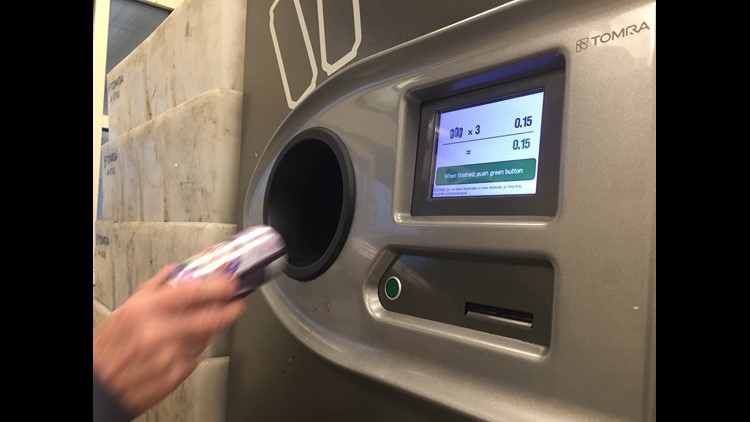HARTFORD -- Connecticut has the lowest bottle redemption rate in the nation and lawmakers are hoping to combat the litter problem on local streets.
Under current law, customers can earn 5 cents for returning qualifying beverage containers, like water bottles, to redemption centers. Nine other states have enacted a bottle law, and Connecticut comes in last place, with only 50.7 percent of qualifying bottles returned in 2017, according to the Container Recycling Institute. Of ten states that have bottle deposit laws in effect, Michigan has the highest rate of redemption at 92.2%.
“We always want to see more recycling,” Democratic Rep. Juan Candelaria said.
To get more residents to participate, state lawmakers have proposed several changes to the bottle law this past session including adding more types of containers, increasing deposits, and increasing fees charged to container manufacturers.
Conrad Cutler, who oversees Express Redemption in Wallingford says he is in support of a potential bottle bill expansion. Cutler says expansion would be crucial to beverage customers and the redemption centers—more customers would be inclined to bring their containers in and redemption centers will generate more revenue. Local organizations also fundraise though collecting bottles and more money could be raised if the law is expanded.
Cutler argues that deposits should be added on to the price of more beverage containers, such as Gatorade and juices, because they are made of the same plastic as water and soda containers.
“[There is] no reason they should be treated differently,” Cutler said.
One bill that was proposed during the 2018 legislative session would have added a five-cent deposit to alcoholic nip bottles. Democratic State Representatives Juan Candelaria and Roland Lemar proposed the bill in hopes of making the grounds and sidewalks of New Haven, and other urban areas, cleaner.
Sixty-seven percent of voters in the New Haven Independent’s online poll, are in support of the nip bill.
Bottle return machines cannot currently process nip bottles, manufacturers said. Chuck Riegle, Senior Vice President of Governor Affairs and Compliance for TOMRA North America, mentioned that alcoholic nips can be returned manually at liquor stores, but there is no automatic solution to returning them. TOMRA makes bottle return machines that are used in the state.
The Connecticut General Assembly did not pass the bill before the session ended last week.
Local legislators have been trying to pass an expansion or revision of the bill for several years, said Chris Nelson, Supervising Environmental Analyst at the Connecticut Department of Energy and Environmental Protection (DEEP). Nelson mentioned that they have either set the proposals aside or have not come to a compromise.
The Connecticut General Assembly mentioned changes to the bottle bill in the 2018 Major Issues Report released this past January, which summarizes important issues for the year.
Nelson said he noticed that lawmakers are the most interested in raising the handling fee charged to container vendors.
Beverage companies, like the Coca-Cola Co., must pay a handling fee to the redemption centers for each bottle from their brand returned. Companies pay 1.5 cents for returned beer containers and 2 cents for returned soda and water containers in Connecticut, Cutler said. Redemption centers rely on this fee to keep their doors open, as most local redemption centers, including Express Redemption Center, are self-funded.
Cutler believes that the fees need to be increased along with minimum wage.
SARAH Redemption Center in East Haven closed due to insufficient funding—the handling fee being one of the insufficiencies, said Edith Pestana, Administrator of the Environmental Justice Program at CT DEEP.
CT DEEP was disappointed to see SARAH close because the facility hired those with disabilities. DEEP is concerned that other redemption centers may close due to not making enough income.
The other states that offer bottle deposits are California, Hawaii, Iowa, Massachusetts, Maine, Michigan, New York, Oregon and Vermont. Every state has a higher redemption rate, including neighboring states of Massachusetts (57.1 percent) and New York (66 percent), according to the latest data from the Container Recycling Institute.
| State | Deposit Amount | Redemption Rate | Handling fee container vendors pay |
|---|---|---|---|
| CA | >24 oz. 10¢ , <24 oz. 5¢ | 70%* | state pays: rate of $0.01046 per container |
| CT | 5¢ | 50.7 %* | Beer 1.5¢, others 2¢ |
| HI | 5¢ | 65%*** | Deposit Beverage Container Fund pays: 2-4¢ |
| IA | 5¢ | 64%** | 1¢ |
| MA | 5¢ | 57.1%*** | 2.25-3.25¢ |
| ME | Wine/liquor >50ML 15¢, others 5¢ | 84%*** | 4¢ |
| MI | 10¢ | 92.2%** | none |
| NY | 5¢ | 66%** | 3.5¢ |
| OR | 10¢ | 82%*** | none |
| VT | liquor 15¢, others 5¢ | 75%*** | 4¢ brand-sorted, 3.5¢ comingled brands |
*FY '17, **CY 2016, ***CY 2017
Michigan was the first state to enact a bottle bill in 1976. Connecticut followed by enacting the bottle bill in 1978. The most recent enactment was the state of Hawaii in 2002.
DEEP reports that any unclaimed deposits, from bottles that were not redeemed at a redemption center, will be paid to the State of Connecticut's General Fund.
Miner says that just because 50 percent of Connecticut residents are not returning bottles to a redemption center, does not mean they aren’t being recycled.
“It costs a lot of money to separate those commodities when they are comingled in a blue bin,” he said.
Miner also said that citizens interpret the bottle deposit as a tax upon themselves.
“I’m not surprised that people are looking at the nickel as a tax,” Miner said, “so they just recycle the product and don’t redeem it.”



